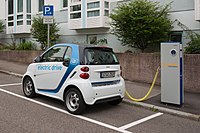Plug-in electric vehicles in Canada
This article needs to be updated. (April 2022) |

The stock of plug-in electric passenger cars in Canada in use totaled 141,060 units at the end of 2019, consisting of 78,680 all-electric cars and 62,380 plug-in hybrids.[1] Sales totaled 50,960 units in 2019.[1]
The Chevrolet Volt was the top selling plug-in hybrid, with cumulative sales of 13,619 units through December 2017, and the Tesla Model S was the top selling all-electric car with 6,731 units as of December 2017.[2]
Quebec is the regional market leader in Canada, with about 11,000 plug-in electric cars registered as of September 2016[update], of which, 55% are plug-in hybrids. Registrations in the province totaled 3,100 units in 2015, representing a market share of 0.7% of new car sales, and 45% of total Canadian plug-in electric car sales that year.[3]
On December 21, 2022, Steven Guilbeault, Canada's minister of environment and climate change, unveiled a regulation that would require increasing percentages of vehicle sales in Canada to be zero-emissions vehicles, up to 100% by the year 2035. The regulations will require that at least 20 percent of new vehicles sold in Canada will be zero emission by 2026, at least 60 percent by 2030, and 100 percent by 2035.[4]
Overview by province or territory
Articles about plug-in electric vehicles in individual provinces and territories:
- Alberta
- British Columbia
- Manitoba
- New Brunswick
- Newfoundland and Labrador
- Northwest Territories
- Nova Scotia
- Ontario
- Prince Edward Island
- Quebec
- Saskatchewan
- Yukon
Government incentives

The Canadian government provides a rebate of C$5000 to the purchase of an electric vehicle.[4]
Models available
In January 2009, Hydro-Québec and Mitsubishi signed an agreement to test 50 i-MiEV, at the time, the largest pilot test of electric cars in Canada ever. The test's goal was to allow a better understanding of winter usage of the technology. BC-Hydro and Mitsubishi had previously tested a three-vehicle fleet in British Columbia.[5] In October 2010, Transport Canada and Mitsubishi Motor Sales of Canada announced a partnership to test the Mitsubishi i-MiEV. Transport Canada's ecoTECHNOLOGY for Vehicles (eTV) Program tested two i-MiEVs in government facilities and in a variety of real-world conditions. This program aim was to evaluate the i-MiEV road performance and range.[6] Retail sales of the i-MiEV began in December 2011,[7][8]
The Nissan Leaf roll-out in Canada began with fleet customers on July 29, 2011,[9] and deliveries to individuals began in late September 2011.[10][11] As of December 2011[update], the Leaf was sold only through 27 Leaf-certified dealers for the entire country, and sales were limited to customers who live within a 65 km (40 mi) radius of one of those dealers.[12] Cumulative sales through December 2014 reached 1,965 units, and, as of December 2014[update], the Leaf ranked as the top selling all-electric car in the country.[13][14]

Retail sales of the Tesla Model S began in 2012, with 95 cars delivered that year. A total of 638 units were sold in 2013, and cumulative sales reached 1,580 units through December 2014, allowing the Model S to rank as the second best selling all-electric car in the country.[13][15] During 2014 the BMW i3, Kia Soul EV, BMW i8 and Porsche 918 Spyder were introduced in the Canadian market.[13] The top selling models in 2015 were the Tesla Model S with 2,010 units, followed by the Chevrolet Volt with 1,463, the Nissan Leaf with 1,233, the BMW i3 with 367, and the Kia Soul EV with 318.[16] In 2015, the Model S passed the Nissan Leaf as the all-time best selling all-electric car in Canada.[17][18]
The all-electric Renault Twizy 40 low-speed quadricycle was certified by Transport Canada in March 2016, and was scheduled to be released on the Canadian market by mid-2016.[19]
British Columbia is the only place in the country where it is legal to drive a low-speed vehicle (LSV) electric car on public roads, although it also requires low speed warning marking and flashing lights. Quebec is allowing LSVs in a three-year pilot project. These cars will not be allowed on the highway, but will be allowed on city streets.[citation needed]
Sales
There were 18,451 highway legal plug-in electric cars registered in Canada as of December 2015[update], of which, 10,034 (54%) are all-electric cars and 8,417 (46%) are plug-in hybrids. These figures include some used imports from the U.S.[20] Until 2014 Canadian sales were evenly split between all-electric cars (50.8)% and plug-in hybrids (49.2%).[13]
The Chevrolet Volt, released in 2011, is the all-time top selling plug-in electric vehicle in the country, with cumulative sales of 6,387 units through May 2015 (representing over 30% of all plug-in cars sold in the country).[21][16][22] Ranking second is the Tesla Model S with 4,160 units sold through April 2016, followed by the Nissan Leaf with 3,692 units delivered as of May 2016[update].[21][16][14] The Model S was the top selling plug-in electric car in Canada in 2015 with 2,010 units sold.[16][20]
A total of 1,969 plug-in cars were sold in 2012, up from 521 in 2011. Sales climbed 57.7% in 2013 to 3,106 units, and in 2014 were up 63.0% from 2013 to 5,062 units, reaching cumulative sales of 10,658 plug-in cars through December 2014. The market share of the plug-in electric car segment grew from 0.03% in 2011, to 0.12% in 2012, and reached 0.27% of new car sales in the country in 2014.[13] Cumulative sales reached the 30,000 unit mark in January 2017.[23]
The following table presents new car sales by year of all the highway-capable plug-in electric cars available in Canada between 2011 and December 2015.
| Model | Total 2011-2015 |
2015 | 2014 | 2013 | 2012 | 2011 |
|---|---|---|---|---|---|---|
| Chevrolet Volt[22] | 5,415 | 1,463 | 1,521 | 931 | 1,225 | 275 |
| Tesla Model S[16] | 3,590 | 2,010 | 847 | 638 | 95 | |
| Nissan Leaf[14] | 3,198 | 1,233 | 1,085 | 470 | 240 | 170 |
| Smart electric drive[16] | 1,132 | 306 | 561 | 222 | 28 | 15 |
| Mitsubishi i MiEV[24] | 617 | 121 | 109 | 168 | 196 | 23 |
| Ford C-Max Energi[16] | 609 | 138 | 272 | 199 | ||
| BMW i3[16] | 566 | 367 | 199 | |||
| Ford Fusion Energi[16] | 429 | 144 | 169 | 116 | ||
| Toyota Prius Plug-in Hybrid[16] | 394 | 43 | 76 | 212 | 63 | |
| Kia Soul EV[16] | 357 | 318 | 39 | |||
| Ford Focus Electric[16] | 244 | 42 | 44 | 103 | 55 | |
| BMW i8[16] | 228 | 200 | 28 | |||
| Porsche Cayenne S E-Hybrid[16] | 213 | 213 | ||||
| Fisker Karma[16] | 100 | 7 | 26 | 67 | ||
| Cadillac ELR[16] | 73 | 25 | 44 | 4 | ||
| Chevrolet Spark EV[16] | 66 | 35 | 26 | 5 | ||
| Porsche Panamera S E-Hybrid[16] | 65 | 20 | 45 | |||
| Tesla Roadster[16] | 53 | 53 | ||||
| Porsche 918 Spyder[16] | 28 | 21 | 7 | |||
| Audi A3 Sportback e-tron[16] | 24 | 24 | ||||
| McLaren P1[16] | 9 | 6 | 3 | |||
| BMW X5 xDrive40e[16] | 5 | 5 | ||||
| Toyota RAV4 EV[16] | 4 | 1 | 3 | |||
| Total new plug-in car sales[16] | 17,995 | 6,990 | 5,322 | 3,178 | 1,969 | 536 |
| PEV market share of new car sales[16] | 0.37% | 0.29% | 0.18% | 0.12% | 0.03% | |
| Note: New car sales seldom correspond to registrations figures, as some plug-in model registered are used imports from the U.S. and some model numbers may declined as more cars are being taken off the road than are being sold. | ||||||
See also
References
- ^ a b International Energy Agency (IEA), Clean Energy Ministerial, and Electric Vehicles Initiative (EVI) (June 2020). "Global EV Outlook 2020: Entering the decade of electric drive?". IEA Publications. Retrieved 2020-06-15.
{{cite web}}: CS1 maint: multiple names: authors list (link) See Statistical annex, pp. 247–252 (See Tables A.1 and A.12). - ^ Schmidt, Eric (2018-02-18). "Electric Vehicle Sales In Canada, 2017". FleetCarma News. Retrieved 2018-02-17.
- ^ France Mobilité Électrique - AVERE France (2016-10-28). "L'Assemblée nationale du Québec adopte la loi véhicules zéro émission" [Quebec's National Assembly enacted a zero emissions vehicle law] (in French). AVERE. Retrieved 2016-10-28.
- ^ a b Canada, Environment and Climate Change (2022-12-21). "Let it roll: The Government of Canada moves to increase the supply of electric vehicles for Canadians". www.canada.ca. Retrieved 2023-06-02.
- ^ Louis Butcher (2010-01-14). "Hydro-Québec s'associe à Mitsubishi pour tester une cinquantaine de véhicules électriques" [Hydro-Quebec joins Mitsubishi to test fifty electric vehicles] (in French). Rue Frontenac. Retrieved 2010-05-30.
- ^ "Government of Canada and Mitsubishi Motor Sales of Canada partner to conduct all-electric vehicle trials". Transport Canada. 2010-10-20. Archived from the original on 2010-10-24. Retrieved 2011-01-12.
- ^ Ian Palmer (2012-03-14). "2012 Mitsubishi i-MiEV gains traction in Canada". CarPages.ca. Archived from the original on 2013-10-13. Retrieved 2012-03-20.
- ^ Michael Bettencourt (2011-10-17). "Cheapest fully electric vehicle coming to Canada soon". The Globe and Mail. Retrieved 2011-10-24.
- ^ "First Nissan Leaf EV Arrives In Canada". Nissan in the News. 2011-07-29. Archived from the original on 2012-03-24. Retrieved 2011-07-31.
- ^ Nissan Canada (2011-09-23). "Nissan Canada delivers first 100% electric Nissan LEAF to Canadian consumer". PR Newswire. Retrieved 2011-11-05.
- ^ Nissan Canada (2011-10-06). "Nissan Canada Delivers British Columbia's First 100% Electric Nissan LEAF to Retail Customer". Canada Newswire. Retrieved 2011-11-05.
- ^ "Chevrolet Volt handily outselling Nissan LEAF in Canada". Auto North. 2011-12-13. Archived from the original on 2012-01-04. Retrieved 2011-12-13.
- ^ a b c d e Klippenstein, Matthew (2015-02-06). "Plug-in electric car sales in Canada, January 2015". Green Car Reports. Retrieved 2015-02-07. Estimated sales for Ford Energi models. Tesla Model S, Smart ED and the other figures with yellow background from IHS data.
- ^ a b c "Nissan Leaf Sales Figures". Good Car Bad Car. January 2016. Retrieved 2016-06-19.
- ^ "Tesla Model S Sales Figures". Good Car Bad Car. January 2015. Retrieved 2015-02-07.
- ^ a b c d e f g h i j k l m n o p q r s t u v w x y z Klippenstein, Matthew (February 2016). "Canadian Plug-in Electric Vehicle Sales". Green Car Reports. Retrieved 2016-02-07.Tesla Model S sales figures from IHS data.
- ^ Klippenstein, Matthew (2016-01-20). "Plug-in electric car sales in Canada, December 2015: Tesla Model S-Capades". Green Car Reports. Retrieved 2016-06-19. Estimated sales for Ford Energi models. Tesla Model S, Smart ED and the other figures with yellow background from IHS data.
- ^ Bubbers, Matt (2016-04-06). "Current green cars with biggest rebates as governments sweeten deals". The Globe and Mail. Retrieved 2016-06-19.
- ^ Millikin, Mike (2016-03-18). "Renault Twizy 40 arrives in Canada". Green Car Congress. Retrieved 2016-03-20.
- ^ a b Stevens, Matthew (2016-02-09). "Electric Vehicle Sales in Canada: 2015 Final Numbers". Fleetcarma.com. Retrieved 2016-02-28. See table "Total Canadian EV fleet" and graph "EVs in Canada by Model"
- ^ a b Klippenstein, Matthew (2016-06-14). "Plug-in Electric Car Sales in Canada, May 2016: Canada crosses 20,000 cars with plugs". Green Car Reports. Retrieved 2016-06-14.
- ^ a b "Chevrolet Volt Sales Figures". Good Car Bad Car. January 2016. Retrieved 2016-06-19.
- ^ "Electric Vehicle Sales in Canada: Q1 2017". Fleetcarma.com.
- ^ "Mitsubishi i MiEV Sales Figures". Good Car Bad Car. January 2015. Retrieved 2016-06-19. A total of 23 units were sold in 2011, 196 in 2012, 168 in 2013, 109 in 2014, and 121 in 2015.


